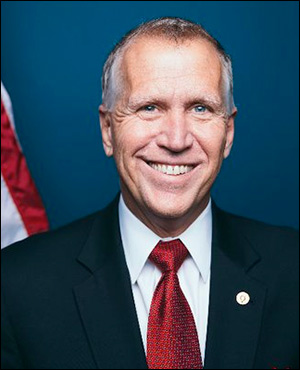By Jim Ellis

North Carolina Sen. Thom Tillis (R)
A WPA Intelligence poll for the Club for Growth PAC (May 19-21; 502 likely North Carolina Republican primary voters) finds Sen. Tillis leading a hypothetical GOP primary against three-term Rep. Mark Walker (R-Greensboro) wealthy businessman Garland Tucker, and accountant Sandy Smith, 40-17-11-2 percent. Though Tillis is below 50 percent, North Carolina election law requires only a 30 percent vote total to win nomination, meaning the senator would be well over the required minimum.
At this point, Tucker and Smith are announced Republican primary opponents, with the former having the potential of becoming a competitive candidate. Several weeks ago, Rep. Walker ruled out running for the Senate, but his latest statements appear to suggest that he is more open to entering the statewide campaign.
Isolating Sen. Tillis and Rep. Walker into a head-to-head contest, which is not realistic from a probable political perspective but is helpful in a polling context, finds Sen. Tillis leading 43-34 percent. But, WPA finds it takes little in the way of persuasion to arrive at a very different result.
According to poll results, when just the following bios are read, the ballot test virtually switches:
Rep. Walker is a pastor and a proven conservative member of Congress who has been a consistent supporter of President Trump’s agenda of low taxes, draining the swamp and shrinking government, no amnesty for illegal immigration, and building the wall.
Sen. Tillis is a U.S. senator who, before being elected, was a business consultant, a town commissioner, and speaker of the North Carolina House of Representatives. In the Senate, Tillis has served on key committees to support our farmers, strengthen our national defense, and serve our veterans. After voters hear this information, Walker leads by more than 30 points.
Upon hearing the bio differences, the ballot test switches to 64-28 percent in Walker’s favor. Clearly, identifying Rep. Walker as a Trump supporter makes the key difference in this radical preference change. Thus, the Tillis weakness is identifiable in that he is not as strongly tied to Trump as Rep. Walker and possibly the other Republican opponents.
A definitive area of weakness for the senator is his stance in sponsoring a bill that would have prevented President Trump from firing a special prosecutor. Once the respondents are informed of this, 52 percent said they would consider voting for a Republican candidate other than Tillis. Only 17 percent indicated they would support re-nominating him and 18 percent said they would vote against Tillis regardless of which Republican opposed him.
After all push questions were asked, another full ballot test question was posed. At this point, it is Rep. Walker who takes a commanding lead, topping Sen. Tillis 56-18 percent, with Tucker and Smith scoring eight percent and two percent, respectively.
The recent poll, complete with an adequate sample size for a North Carolina Republican election, tells us that, under the right circumstances, Sen. Tillis could have a difficult time winning re-nomination.
It has been common knowledge that the North Carolina general election will be tight, and with the state’s electorate having the penchant for defeating incumbent senators, none can ever be considered safe. Therefore, it appears, that both the 2020 Republican senatorial primary, as well as the general election, merits close attention.
